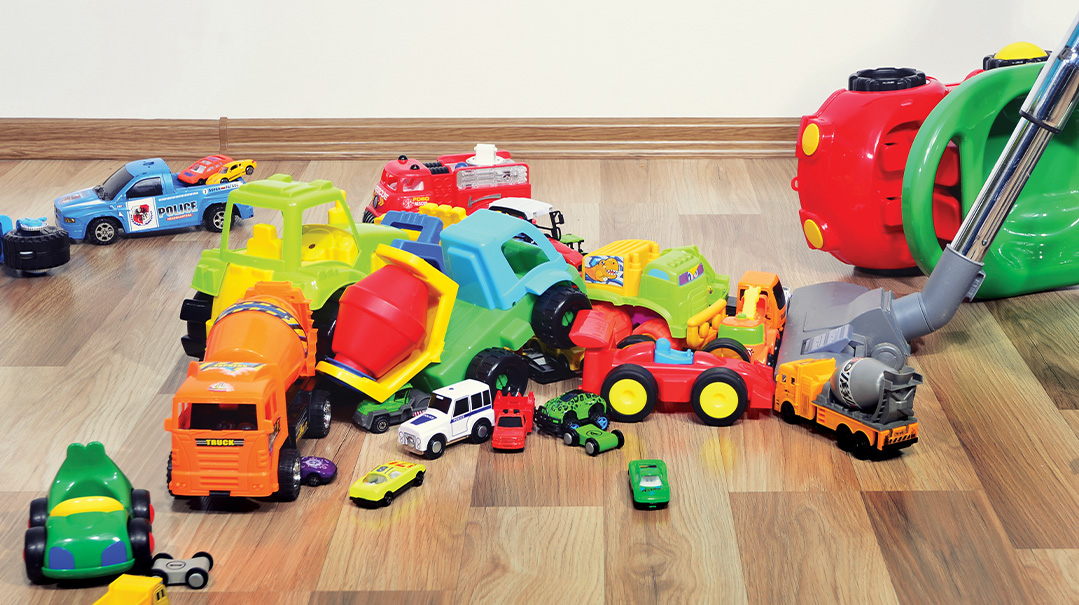Practically Perfect

The house was perfectly clean, the table picture-perfect, the food cooked to perfection. And I was a perfect wreck

Perfect.
Everything will be perfect.
I’ll have a perfect menu, a perfect table, and a perfectly clean house.
My husband of six months had just informed me that he would be completing a masechta the next week.
“Do you want to go out to eat?” I asked. “My father always took us to a fancy restaurant when he made a siyum.”
“Actually, I was thinking of making a siyum here,” my husband casually informed me. “We’ll invite my parents and your parents and all of our siblings.”
What?!? No way! How will I ever manage?
Yet as the idea settled, I thought, Wait, this is a wonderful chance to show everyone what I can do. I’m going to make one perfect dinner.
I spent the next week agonizing over menus, cooking up a storm, figuring out seating arrangements, and frantically cleaning every nook and cranny of our apartment.
The big night arrived. The house was perfectly clean, the table picture-perfect, the food cooked to perfection. And I was a perfect wreck.
The combination of stress, a series of too many late nights, and neglecting to eat and drink properly was a recipe for a migraine. By the time I realized what I had done to myself, I was too far gone to be able to keep down painkillers. I spent my “perfect” evening wishing everyone would just hurry up and leave already.
Unfortunately, I didn’t learn anything from the incident. For years, I continued to struggle valiantly to be a perfect wife, mother, teacher, and homemaker. I wanted to have a freshly cooked well-balanced meal on the table every night for dinner, the clothing folded just so on the shelves, the checkbook balanced to the penny, and time to play with and read to my kids each day. Bedtime, of course, should be exactly the same time each evening. Throw into the mix a physically demanding special-education job with a commute. I was juggling more balls than I could ever hope to keep up in a perfect array simultaneously. Something had to give.
A peek into my closets and drawers would have shown neatly folded piles of clothing. But come the frantic early-morning rush to get everyone dressed before I left for work, I was pulling clean school clothing from the pile on the couch or dining room table where it was waiting to be perfectly folded before being put precisely in its designated place. The clothing inside the closet was an illusion; it stayed where it was because nothing fit.
The toys on the shelves were carefully lined up with every piece accounted for. But that represented a mere fraction of the play items in the house. The rest of the myriad pieces, gifted on birthdays or Chanukah or purchased as afikomen presents, were haphazardly strewn all over the floor. At night I was too exhausted to put each toy exactly where it belonged. Since I couldn’t do it perfectly I merely kicked things to the side to leave a clear path for walking. Tomorrow, I thought, as a yawn cracked my face, maybe tomorrow I’ll somehow manage to clean this place perfectly.
Although my husband had fresh dinners regularly, the kids, who needed to be served supper earlier, subsisted on fish sticks, frozen pizza, and bagels. Perfectly balanced meals beginning with a fruit, followed by a healthy carb, protein, and vegetable were a thing of the past.
So many of those balls I’d been juggling had dropped and were rolling neglected on the floor.
You’re a total failure, my inner critic pointed out. You don’t keep the house clean, you don’t cook proper meals, and your mornings are a mad, chaotic rush. What kind of a way is that to send your kids off to school?
If I’d be more organized and get to bed on time, I’d work more efficiently and accomplish a lot more on my to-do list, the voice of guilt added in. Plus if I’d trained my kids to clean up after themselves, the house would be a whole lot cleaner to begin with.
If only my husband would help a bit more, I’m sure the house would be in ship-shape order, blame asserted.
I was too overwhelmed with getting through each day to be able to think up a better strategy. As inefficient as my methods were, change seemed impossible. I continued pushing myself past my limits and the results were ludicrously dismal. My house was clutter city. What we had originally called the railroad room, a room that was a walkthrough to the extension out back, was now dubbed the (w)rec(k) room.
The thought of having company over was cause for a bout of anxiety. How will I vanish the mess before they arrive? Pesach cleaning was a total nightmare. How would I ever manage to clean amid the chaos that reigned in every corner of my house? My desire to do things perfectly was holding me back from maintaining even a basic semblance of order. Something had to give.
One day as I visited by my parents, I noticed the Boggle box on the table. I’ve always loved words and Boggle was one of my favorite childhood games. I learned at a young age to try to build on the simple words I found to get longer words by adding a prefix or suffix. Inspiration struck: If it works in Boggle, why not in real life as well? Thus was born my new modus operandi.
It may not be practical for me to spend half an hour cleaning my stovetop until it sparkles and looks practically brand new. But I can give it a five-minute scrub after getting dinner in the oven and before I have to run to the bus stop to meet my children. My stove may not be clean, but it is cleaner. And everyone knows a six-letter word is worth more than a four-letter one.
By the same token, it’s not practical for me to put everything in my life on hold to make my boys’ bedroom look as neat as a pin. Yet, I can spend a quarter of an hour tidying things as I supervise homework. A peek inside after I’m through will reveal lots of clutter and miscellaneous collections in random locations. By regular standards the room is not even neat. But it is 15 minutes neater.
It is rather impractical for me to cook fully balanced meals from scratch each day. But by cooking once and serving twice I can eliminate some of the formerly ubiquitous fish sticks and frozen pizza from the menu. True, Wednesday night’s dinner is identical to Monday evening’s meal, Thursday is a repeat of Tuesday and Sunday’s supper looks a lot like the Shabbos seudos. Yet, the simple reheat keeps everyone well nourished while freeing up time for other formerly neglected tasks.
It is a slow process. Eventually, though, all the extra points for the longer words I create add up. Slowly cleaner plus cleaner almost equals clean. Neater followed by neater helps bridge the gap to neat. (For those questioning the mathematical reality of this, think of adding fractions to equal a whole.)
My picture-perfect home is still a thing of my dreams. However, I now host Shabbos guests routinely and no longer fear an unexpected ring on the doorbell. By letting go of perfection, I have learned to keep all my balls in the air. No they do not form a perfect arc. Some balls are soaring high while others are just barely making it from one side to the other. Yet, my home is practically perfect — and that works perfectly for me.
(Originally featured in Family First, Issue 558)
Oops! We could not locate your form.













